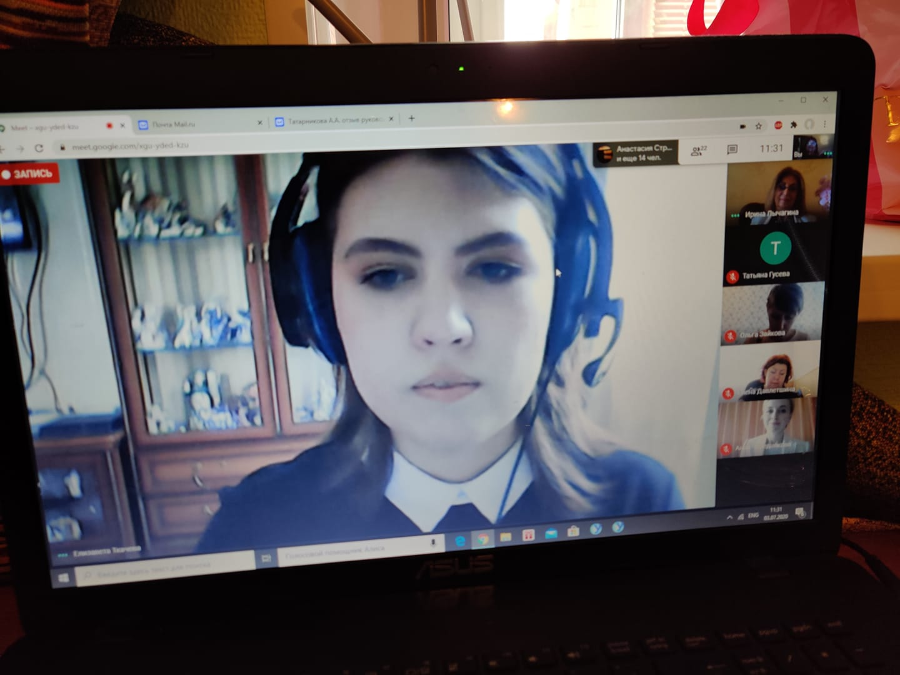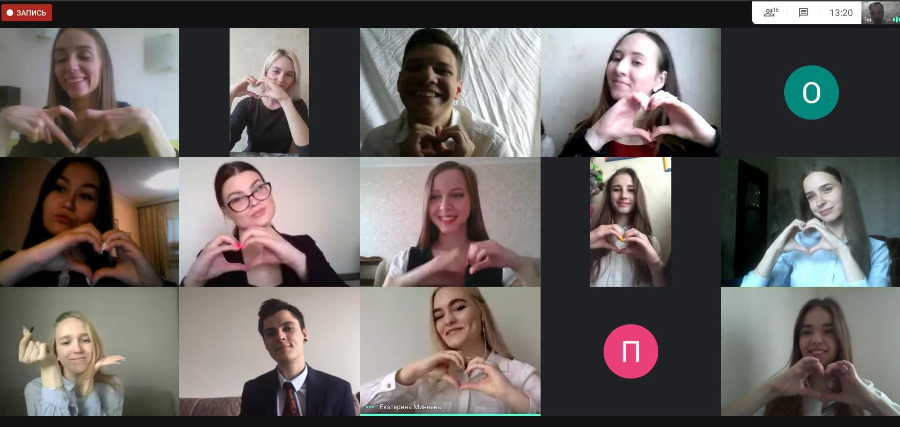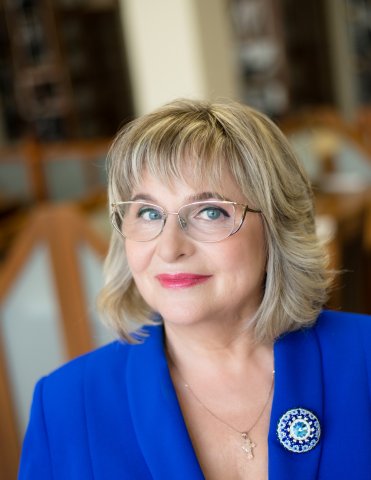The defence of graduation theses in the remote mode has ended at the Department of Journalism, Advertising and Public Relations of the Institute of Media, Social Sciences and Humanities. The Department’s 68 graduates successfully presented in their graduation works a wide range of studies on the pressing problems of the modern media space, advertising technologies, strategic integrated communications from developing promotional programs to creating virtual reality. We asked the Head of the SUSU Department of Journalism, Advertising and Public Relations, Doctor of Sciences (Philology) Liudmila Shesterkina to answer our questions based on the results of distance learning of the future media specialists.
— What educational and information technologies of distance learning turned out to be the most successful ones?
— Distance learning for our students, like throughout the university, was carried out mainly on the Internet platforms, such as Big Blue Button, ZOOM and Google Meet. On these sites, the technologies of electronic courses proved to be successful, which made it possible to systematize the lecture, practical, and methodological materials. Students evenly received and completed assignments, teachers systematically controlled the process of mastering the courses.
Many teachers note that the technology of the forum or online polls proved to be effective for seminars. Technologies of project training also blended in well with the distance education — managing of projects by students, regular reports on completing assignments in the form of presentations, reports, online forums, interactive project defences at the end of the semester were successful. At the same time, some teachers noted that it is possible to conduct only online lectures with an obvious positive result, while practical classes, in their opinion, must be transferred strictly to offline. They also pointed out that during online exams, having one camera, teachers cannot carefully monitor the students’ preparation process. Also, there is an opportunity to prepare questions and arrange debriefing (a discussion in the form of comments) on Google Classroom. There are many tutorials on the Internet on how to adapt a particular service to teaching and remote knowledge testing — so, in my opinion, there are no problems with it.

— Which educational methods of distance learning proved to be successful?
— The distant learning led to updating the methodology for involving students in a lesson, arousing their interest in the lesson, taking into account the online format. Various methods of involvement were used: brainstorming, questioning, polls, opinion research, etc. The research methodology was widely used: teachers instructed students on how to study a specific topic or problem. Students conducted independent research, watched videos, listened to audios, read articles, were engaged in crowdsourcing, searched for answers in forums and chat rooms. But in all situations, the explanation by the teacher was always methodologically important. At the development stage, students remotely applied the new knowledge in the preparation of real media material for any type of media sources. At the final stage of the course, there was always a quiz and an assessment of the degree to which students had mastered the topic.
— What distance learning practices did you find most interesting?
— The transition to the remote mode is, by and large, a very interesting and valuable practice in teaching journalism, advertising and public relations, when conveying the meaning and essence of the profession as a creative, constructive and socially responsible activity becomes especially important, and at the same time, teachers must demonstrate their level of technological training in the conditions of digital transformation of the media space. Today, it includes a wide choice of teaching platforms, the possibility to broadcast live and video conferences, using them both as a training professional platform and to check students' interest in courses, including using tools such as Facebook Live and VK Live, Telegram, Instagram and other social networks to improve the learning process.
— What methodological innovations did you apply in distance learning?
— The most important methodological innovations were developed on a university-wide basis — three training regulations using e-learning, distance learning technologies in the Electronic SUSU resource: conducting classes, interim assessment, and Final State Certification.
For successful studies, we uploaded everything necessary on the portal: theoretical material, algorithms for creating media materials, tips, training tests, and reference materials. The regulations provide for giving lectures, seminars, and practical classes; online consultation; and scheduled exams. They also contain elements of explanation; exam procedure description: exam announcements; links to video broadcast; rules for identifying students on video; design standards of graduation theses (samples of cover page, assignments, tables of contents, annotations, reference, design guidelines, etc.). Technological consultations were organized for members of the State Examination Board, students and supervisors of graduation theses; instructions on the preparation and defence procedure of the graduation theses were posted; instructions on summarizing in the videos were posted, etc.
Students received the full amount of knowledge in accordance with the work programmes of the studied disciplines located on the electronic portal, which both students and teachers have access to.

— Do you consider this teaching experience successful? What problems have you encountered and what "lessons" will you draw for the future?
— We consider this experience to be successful, because we have fully completed all the work programmes, administered credits and exams, and organized the defence of the graduation theses. As for the problems, this is, first of all, a large amount of work on the design and content of the electronic course. It also turned out that preparing for online classes requires a lot more time; what is more, for successful online teaching, servers and teaching platforms must work without failures. So basically, at the beginning there were technical problems: unstable connection, broadcast failures, personal computer illiteracy of some teachers, lack of remote-work skills.
For some teachers, psychological difficulties arose in the absence of live communication. It turned out that it was difficult for them to deliver a lecture without seeing the reaction of the audience. There were difficulties with students' feedback, students did not always, especially at the beginning of online learning, understand the essence of teaching comments and advice; it took time to get into the mode of online communication and reach mutual understanding.
For teachers, the time for checking materials, those with graphics for instance, increased by several times, since each such work takes a very long time to open, and students often send in their works very late. The main lesson is that a teacher needs to keep up to date and master technological innovations. Today this is one of the conditions to remain in the profession. It is necessary to actively study and practice computer technologies, master the formats of collective discussion, create authors' online courses, work more carefully with educational and methodical publications; do everything step by step, sequentially, without getting ahead of oneself. It is not easy for students either: in this situation they have special expectations and hopes connected with their teacher, who simply has no right not to know or not to be able to do something. In the context of distance education, it is especially important to create a business-like, but at the same time trusting and respectful atmosphere of cooperation.
— Do you think that the online teaching of Journalism, Advertising and PR has the “right to life”?
— Of course, online teaching of Journalism, Advertising and Public Relations does have the “right to life”. In the quarantine situation it turned out to be the only way to study, and it seems to me, it will be especially in demand in the correspondence department and as part of the Master's degree programmes. And due to the fact that professionalism in the conditions of digitalization of the media environment requires a confident knowledge of digital technologies and the ability to work in the Internet space, distance learning has clearly contributed to this. The experience of these months showed that in the distance format the teachers have the opportunity to give students more material for self-study, to control each student's assignments, and to return to the course materials at any time; create an original online course in the framework of project training; give lectures using video communication, audio communication, as well as video recordings.
Students could partially hone their practice on their own, having a mobile phone that allows shooting stories, editing, recording television and radio materials, writing texts, working on the air and online media.
However, in our opinion, the online format for all this is most relevant in terms of teaching general theoretical courses, but it is still more efficient to master special disciplines and practical training being directly in the conditions of real production because in spite of the high level of technologicalization, our professions continue to belong to the group "man-to-man" (and not "man-to-machine" or "man-to-technical system") and are among the most difficult professions.
Creativity also has its own specifics: these are, in particular, the need to reflect the phenomena of life and the author’s attitude to these phenomena, the processes of self-knowledge of a person, cognition of the world, expression and communication of emotions, the manifestation of social activity, citizenship, moral principles as the most important professional qualities. By and large, it is possible to teach all this only in conditions of active discussions, direct live communication of a teacher with students. The teacher’s personality, his/her talent, experience and practical recommendations cannot be replaced by online communication, and the practice of online education itself is not suitable for all students if we take into account the individual learning pathways. But, once again, for us this is a very valuable experience — we have responded to a new professional challenge of the time. This challenge required each teacher to show such qualities as willingness to accept something new, professionalism, competence, mobility, efficiency, patience, restraint, paying attention, as well as skills in working with digital technology and technologies not used previously. It took the reworking of courses, restructuring of thinking, and, in a sense, restructuring of life. In our opinion, the education system at SUSU has successfully coped with this stage.




